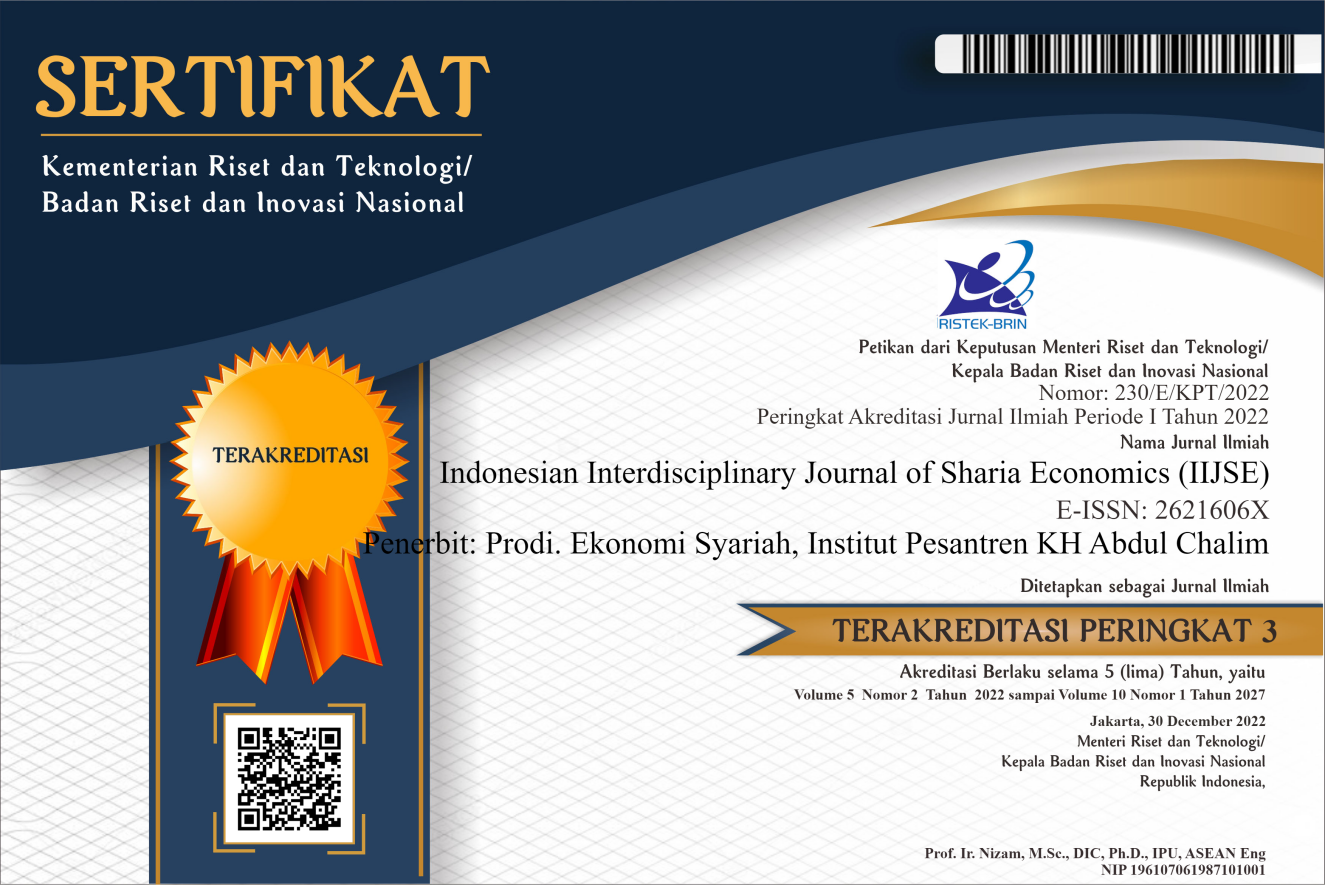Effectiveness of Green Trust as a Mediating Variable in Extending TPB Theory to Electrical Automotive Adoption in Indonesia
Abstract
This research aims to analyze the effectiveness of Green Trust as a mediating variable in expanding the TPB theory for the adoption of electric vehicles in Indonesia. The study method used is a quantitative method. Sampling in this study used a non-probability sampling technique with a purposive sampling method, where researchers deliberately selected respondents who were considered relevant for research purposes. Data was collected through questionnaires to all Indonesian people who have the intention to adopt automotive electrical. The data collection process was carried out through the use of a questionnaire with a Likert scale. The total number of respondents involved in this study was 425 respondents. The data analysis technique used in this study is the SEM PLS method, which consists of outer model and inner model analysis, with the help of SMARTPLS 4.0 software. The research results show that extensions of the TPB theory such as Attitude, Subjective Norm, and PBC variables have an effect on electrical automotive adoption, but green trust does not mediate the relationship between attitude and subjective norm towards adoption (EAV). This research provides valuable recommendations to increase the widespread adoption of electric automobiles in Indonesia.
Downloads
References
Abbasi, H. A., Johl, S. K., Shaari, Z. B. H., Moughal, W., Mazhar, M., Musarat, M. A., Rafiq, W., Farooqi, A. S., & Borovkov, A. (2021). Consumer motivation by using unified theory of acceptance and use of technology towards electric vehicles. Sustainability (Switzerland), 13(21). https://doi.org/10.3390/su132112177
Alos-Simo, L., Verdu-Jover, A. J., & Gomez-Gras, J. M. (2017). How transformational leadership facilitates e-business adoption. Industrial Management and Data Systems, 117(2), 382–397. https://doi.org/10.1108/IMDS-01-2016-0038
Alwadain, A., Fati, S. M., Ali, K., & Ali, R. F. (2024). From theory to practice: An integrated TTF-UTAUT study on electric vehicle adoption behavior. PLoS ONE, 19(3 March). https://doi.org/10.1371/journal.pone.0297890
Bhutto, M. Y., Liu, X., Soomro, Y. A., Ertz, M., & Baeshen, Y. (2021). Adoption of energy‐efficient home appliances: Extending the theory of planned behavior. Sustainability (Switzerland), 13(1), 1–23. https://doi.org/10.3390/su13010250
Boonchunone, S., Nami, M., Krommuang, A., Phonsena, A., & Suwunnamek, O. (2023). Exploring the effects of perceived values on consumer usage intention for electric vehicle in Thailand: the mediating effect of satisfaction. Acta Logistica, 10(2), 151–164. https://doi.org/10.22306/al.v10i2.363
Bougie, R., & Sekaran, U. (2017). Metode Penelitian Untuk Bisnis: Pendekatan Pengembangan-Keahlian (ke 6). Alfabeta.
Brückmann, G., Willibald, F., & Blanco, V. (2021). Battery Electric Vehicle adoption in regions without strong policies. Transportation Research Part D: Transport and Environment, 90. https://doi.org/10.1016/j.trd.2020.102615
Chaturvedi, P., Kulshreshtha, K., Tripathi, V., & Agnihotri, D. (2023). Exploring consumers’ motives for electric vehicle adoption: bridging the attitude–behavior gap. Benchmarking, 30(10), 4174–4192. https://doi.org/10.1108/BIJ-10-2021-0618
Choe, J. Y., Kim, J. J., & Hwang, J. (2021). Innovative marketing strategies for the successful construction of drone food delivery services: Merging TAM with TPB. Journal of Travel and Tourism Marketing, 38(1), 16–30. https://doi.org/10.1080/10548408.2020.1862023
Gungaphul, M., & Devi Heeroo, S. (2022). Third Party Logistics Outsourcing: An Exploratory Study of the Oil and Gas Industry in Nigeria View project GREEN BUYING BEHAVIOR AMONG MAURITIAN CONSUMERS: EXTENDING THE TPB MODEL. International Journal of Social Sciences, 7(3), 189–207. https://doi.org/10.20319/pijss.2022.73.189207
Hamidu, M. (2017). Deducing of an Automobile Design for an Electric Vehicle (EV): Perspective of Technological Acceptance Model (TAM). International Journal of Transportation Engineering and Technology, 3(3), 39. https://doi.org/10.11648/j.ijtet.20170303.12
Hardhianti, V., & Sholahuddin, M. (2024). The Influence Of E-Wom And Perceived Ease Of Use On Purchase Interest In Muslim Fashion Products With Trust As An Intervening Variable (Study On Shopee Users In Surakarta City). In Indonesian Interdisciplinary Journal of Sharia Economics (IIJSE) (Vol. 7, Issue 2).
Higueras-Castillo, E., Liébana-Cabanillas, F., Santos, M. A. Dos, Zulauf, K., & Wagner, R. (2024). Do you believe it? Green advertising skepticism and perceived value in buying electric vehicles. Sustainable Development. https://doi.org/10.1002/sd.2932
Higueras-Castillo, E., Singh, V., Singh, V., & Liébana-Cabanillas, F. (2023). Factors affecting adoption intention of electric vehicle: a cross-cultural study. Environment, Development and Sustainability. https://doi.org/10.1007/s10668-023-03865-y
Jayasingh, S., Girija, T., & Arunkumar, S. (2021). Factors influencing consumers’ purchase intention towards electric two‐wheelers. Sustainability (Switzerland), 13(22). https://doi.org/10.3390/su132212851
Jung Moon, S. (2020). Integrating Diffusion of Innovations and Theory of Planned Behavior to Predict Intention to Adopt Electric Vehicles. International Journal of Business and Management, 15(11), 88. https://doi.org/10.5539/ijbm.v15n11p88
Karpurapu, S., & Naga Venkata Raghuram, J. (2024). Synergizing Green Transitions: Exploring EV Usage Risks in South India through the UTAUT2 Model. Qubahan Academic Journal, 4(1), 26–37. https://doi.org/10.58429/qaj.v4n1a370
Mouakket, S., & Aboelmaged, M. (2022). Drivers and outcomes of green information technology adoption in service organizations: an evidence from emerging economy context. Journal of Science and Technology Policy Management, 13(4), 898–924. https://doi.org/10.1108/JSTPM-09-2020-0137
Naufal, M., Widyastuti, H., Sembiring, I. R., & Andrianto, M. S. (2024). Buying Intention on Electric Cars in Jabodetabek Using Combined TAM and TPB (C-TAM-TPB). Jurnal Aplikasi Bisnis Dan Manajemen. https://doi.org/10.17358/jabm.10.1.173
Nur Asida, A. Y., & Kuswati, R. (2023). E-wallet Adoption in The Covid-19 Period: The Roles Of Perceived Benefits As Mediating Variabel. Jurnal Orientasi Bisnis Dan Entrepreneurship (JOBS), 4(1), 23–34. https://doi.org/10.33476/jobs.v4i1.3604
Ong, A. K. S., Cordova, L. N. Z., Longanilla, F. A. B., Caprecho, N. L., Javier, R. A. V., Borres, R. D., & German, J. D. (2023). Purchasing Intentions Analysis of Hybrid Cars Using Random Forest Classifier and Deep Learning. World Electric Vehicle Journal, 14(8). https://doi.org/10.3390/wevj14080227
Ong, A. K. S., German, J. D., Redi, A. A. N. P., Cordova, L. N. Z., Longanilla, F. A. B., Caprecho, N. L., & Javier, R. A. V. (2023). Antecedents of Behavioral Intentions for Purchasing Hybrid Cars Using Sustainability Theory of Planned Behavior Integrated with UTAUT2. Sustainability (Switzerland), 15(9). https://doi.org/10.3390/su15097657
Pramesti, E. A., & Kuswati, R. (2024). Journal of Business and Management Studies Innovative Approaches and Entrepreneurial Intentions: Analyzing Indonesia’s Youth through the Theory of Planned Behavior. https://doi.org/10.32996/jbms
Praswati, A. N., Sari, N. P., & Murwanti, S. (2022). Benefit: Jurnal Manajemen dan Bisnis Youth Entrepreneurial Intention: Theory of Planned Behaviour and Social Cognitive Theory. 7(1), 66–79.
Rachmawati, I., & Rahardi, R. A. M. (2023). Analysis of Electric Vehicle Purchase Intentions in Indonesia Using the Extension C-TAM-TPB Model. International Journal of Current Science Research and Review, 06(12). https://doi.org/10.47191/ijcsrr/V6-i12-61
Rini Kuswati. (2019). Encouraging pro-environmrntal behavior through cunsumer innovvativness. CRC Press.
Rodríguez-Correa, P. A., Franco-Castaño, S., Bermúdez-Hernández, J., Valencia-Arias, A., & Barandiarán-Gamarra, J. M. (2023). Attitudinal Factors Associated with the Use of Bicycles and Electric Scooters. Sustainability (Switzerland), 15(10). https://doi.org/10.3390/su15108191
Sekaran, U., & Bougie, R. (2016). pdf Research Methods For Business : A Skill-Building Approach. In Sekaran dan Bougie (6th ed.). Alfabeta.
Shaikh, S., Talpur, M. A. H., Baig, F., Tariq, F., & Khahro, S. H. (2023). Adoption of Electric Motorcycles in Pakistan: A Technology Acceptance Model Perspective. World Electric Vehicle Journal, 14(10). https://doi.org/10.3390/wevj14100278
Shalender, K., & Sharma, N. (2021). Using extended theory of planned behaviour (TPB) to predict adoption intention of electric vehicles in India. Environment, Development and Sustainability, 23(1), 665–681. https://doi.org/10.1007/s10668-020-00602-7
Sholahuddin, M. (2016). The Role of Muslim in Developing of Islamic Economy in Indonesia.
Sholahuddin, M., & Saputri, I. N. (2020). Benefit: Jurnal Manajemen dan Bisnis Emerging Trends in Production Ethics Research: A Bibliometric Analysis.
Wang, D., Ozden, M., & Tsang, Y. P. (2023). The impact of facilitating conditions on electric vehicle adoption intention in China: An integrated unified theory of acceptance and use of technology model. International Journal of Engineering Business Management, 15. https://doi.org/10.1177/18479790231224715
Wang, S., Fan, J., Zhao, D., Yang, S., & Fu, Y. (2016). Predicting consumers’ intention to adopt hybrid electric vehicles: using an extended version of the theory of planned behavior model. Transportation, 43(1), 123–143. https://doi.org/10.1007/s11116-014-9567-9
Copyright (c) 2024 Abi Yusuf Nur Asida, Rini Kuswati, Muhammad Sholahuddin

This work is licensed under a Creative Commons Attribution-ShareAlike 4.0 International License.
Authors who publish with this journal agree to the following terms:
- Authors retain copyright and grant the journal right of first publication with the work simultaneously licensed under a Creative Commons Attribution License that allows others to share the work with an acknowledgment of the work's authorship and initial publication in this journal.
- Authors are able to enter into separate, additional contractual arrangements for the non-exclusive distribution of the journal's published version of the work (e.g., post it to an institutional repository or publish it in a book), with an acknowledgment of its initial publication in this journal.
- Authors are permitted and encouraged to post their work online (e.g., in institutional repositories or on their website) prior to and during the submission process, as it can lead to productive exchanges, as well as earlier and greater citation of published work.


















